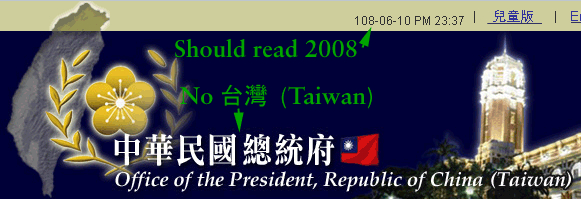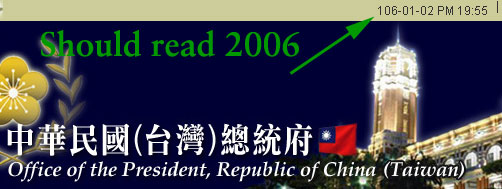Those working in the new administration of President Ma Ying-jeou (Mǎ Yīngjiǔ) are people with priorities. For example, they certainly didn’t waste any time removing the Chinese characters for “Taiwan” from the Web site of the presidential office, as this happened on his first day in office. On the other hand, they didn’t bother with other things, like having the current year be 2008 instead of “108.”
From a screen shot taken a couple of nights ago:

From a screen shot taken about two-and-a-half years ago:

(FWIW, I told a meeting of government webmasters three years ago that the date script needed fixing — or, better still, deletion. Are they really under the impression that lots of people visit the presidential office’s Web site or that of any other Taiwan governmental agency to check the date and time?)
Also, given what the head of the ruling party recently said in the glorious motherland China, perhaps they might want to replace “Office of the President” with “Office of Mr. Ma.”
At any rate, how things are named is a concern of the current administration, just as it was for the previous one. I’ve given up trying to follow the twists and turns of the name of Revere the Bloody Dictator Shrine Chiang Kai-shek Memorial Hall Taiwan Democracy Memorial Hall. Someone let me know when the dust finally settles.
And then there’s the airport. The last time I was on a highway in Taoyuan I noticed that the signs that previously said “CKS Airport” had the “CKS” covered, so they read simply “Airport”. Maybe the new administration can live with that, regardless of what it does about the signage of the airport itself.
But what is to become of the official names that weren’t changed in Mandarin but only in English? Please note that I’m not talking about romanizations but about real English names. I’m referring to how the English names of several ministries and other government agencies were changed during President Chen Shui-bian’s two terms in office, though the Mandarin names remained the same.
For example:
| Mandarin Name | English Name | |
|---|---|---|
| Pre DPP | Current (March 2008) | |
| Yuánzhùmín Wěiyuánhuì | Council of Aboriginal Affairs | Council of Indigenous Peoples |
| Guóyǔhuì | Mandarin Promotion Council | National Languages Committee |
| Zhōnghuá Mínguó Duìwài Màoyì Fāzhǎn Xiéhuì | China External Trade Development Council (CETRA) | Taiwan External Trade Development Council (TAITRA) |
| Qiáowù Wěiyuánhuì | Overseas Chinese Affairs Commission | Overseas Compatriot Affairs Commission |
None of the above revised names have been revoked or changed as of today (June 12, 2008 — or 108-06-12, as the Presidential Office would have it).
What about the addresses of the Web sites of these ministries and agencies?
| name | URL | comments |
|---|---|---|
| Council of Indigenous Peoples | www.apc.gov.tw | APC? According to someone I spoke with at the council, this stands for “Aboriginal People’s Commission” (or maybe “Aboriginal Peoples’ Commission”), a name that dates back to 1996. But I can’t find any search results for that name within .tw domains. Also, neither www.cip.gov.tw nor www.cip.gov.tw leads to anything. But lately the APC site has often been unresponsive. I mentioned to the council that they might want an updated URL; the person I spoke with said she’d look into it. |
| National Languages Committee | www.edu.tw/MANDR/ | This is under the Ministry of Education, which has changed the URL a few times over the years but has yet to revise the focus in the address on Mandarin (i.e., “MANDR”). Not even under the DPP was this address subject to rectification (zhèngmíng, 正名 ). |
| Taiwan External Trade Development Council (TAITRA) | www.taitra.org.tw | The old URL of www.cetra.org.tw leads to nothing, not even a redirect. www.taitra.com.tw mirrors the .org.tw address. This doesn’t have a .gov.tw address because it’s a semi-governmental organization. |
| Overseas Compatriot Affairs Commission | www.ocac.gov.tw | “Overseas Chinese Affairs Commission” and “Overseas Compatriot Affairs Commission” share the same abbreviation. One URL fits all. |
Thus, so far the new English names have survived.
